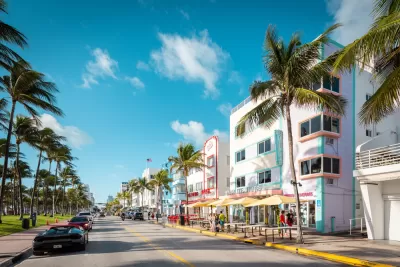Developers planning to build above the city’s current height limit will have to go back to the drawing board.

Miami Beach residents voted to stop the development of two high-rise towers in three different referendums last week, reports Deborah Acosta for the Wall Street Journal.
The project, slated for construction on the site of the now-shuttered Deauville Hotel at a height of 375 feet, would have required voter approval to be exempted from current zoning regulations, which limit building height to 200 feet. “Daniel Ciraldo, executive director of Miami Design Preservation League, said the voters signaled they aren’t ready to approve projects that could significantly change the character of Miami Beach, which is famous for its art deco architecture and lower-rise buildings.”
According to Acosta, “Even though the project is on hold, the hotel, which had been run into disrepair by the family who bought it in 2004 for $4 million, was imploded on Sunday. The nearly 4-acre site will now sit empty until new plans for the site are approved.”
Acosta points out that other developers have had more success in getting projects approved in Miami Beach. “New York developer Michael Shvo, for example, secured approval last week from the Miami Beach Historic Preservation Board for one of his office developments,” with three total projects in the works in the city.
FULL STORY: Major Miami Beach Real-Estate Projects Nixed by Voters

Alabama: Trump Terminates Settlements for Black Communities Harmed By Raw Sewage
Trump deemed the landmark civil rights agreement “illegal DEI and environmental justice policy.”

Planetizen Federal Action Tracker
A weekly monitor of how Trump’s orders and actions are impacting planners and planning in America.

Why Should We Subsidize Public Transportation?
Many public transit agencies face financial stress due to rising costs, declining fare revenue, and declining subsidies. Transit advocates must provide a strong business case for increasing public transit funding.

Understanding Road Diets
An explainer from Momentum highlights the advantages of reducing vehicle lanes in favor of more bike, transit, and pedestrian infrastructure.

New California Law Regulates Warehouse Pollution
A new law tightens building and emissions regulations for large distribution warehouses to mitigate air pollution and traffic in surrounding communities.

Phoenix Announces Opening Date for Light Rail Extension
The South Central extension will connect South Phoenix to downtown and other major hubs starting on June 7.
Urban Design for Planners 1: Software Tools
This six-course series explores essential urban design concepts using open source software and equips planners with the tools they need to participate fully in the urban design process.
Planning for Universal Design
Learn the tools for implementing Universal Design in planning regulations.
Caltrans
Smith Gee Studio
Institute for Housing and Urban Development Studies (IHS)
City of Grandview
Harvard GSD Executive Education
Toledo-Lucas County Plan Commissions
Salt Lake City
NYU Wagner Graduate School of Public Service





























